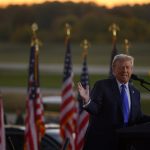
Investing.com — Wolfe Research has identified ten critical policy and political questions that will shape the United States in 2025, as the political landscape reorients under a new Republican administration.
These questions, compiled in a detailed note, explore the uncertainty and complexities of navigating policy under the Trump administration.
Each question represents considerations for governance, market impact, and broader economic implications.
The confirmation of Trump’s nominees is the first major hurdle. While most are expected to be confirmed, a few controversial figures face potential resistance.
Nominees like RFK Jr. at the Department of Health and Human Services (HHS) carry specific market implications, especially concerning healthcare sector regulations.
Mass deportation policies are poised to redefine immigration dynamics, but the scale and effectiveness remain uncertain.
Analysts expect a marked decline in net migration but note that operational and legal constraints may temper the administration’s ambitions.
Trump’s tariff agenda presents another point of contention. While threats of sweeping tariffs may serve as negotiating tools, the administration is likely to implement selective tariffs, particularly targeting China.
These moves are expected to have market repercussions, especially in tariff-exposed sectors.
Tax policy under the new administration will also be a focal point. Republicans aim to extend Trump-era tax cuts, but narrow congressional margins may necessitate compromises, including spending cuts in areas like healthcare and energy subsidies.
A rollback of clean energy tax credits and reforms to Medicaid are among potential cost-saving measures being debated.
Healthcare is a prominent theme, with the appointment of RFK Jr. raising questions about vaccine policies, drug pricing, and public health reform.
Initial signs suggest a less disruptive approach than feared, with attention likely focused on institutional reforms rather than confrontational regulatory changes.
The administration’s deregulatory ambitions, epitomized by the Department of Government Efficiency, face legal and procedural barriers.
While certain industries, such as traditional energy and financial services, may benefit from regulatory rollback, broad-scale deregulation may be slower than anticipated due to judicial challenges.
In antitrust policy, Trump’s picks for regulatory roles signal a pro-business stance. However, a populist influence, especially in sectors like Big Tech, cannot be entirely ruled out, reflecting internal divisions within the Republican agenda.
The note underscores fiscal sustainability as a long-term challenge. Despite promises of economic growth and deficit reduction, analysts at Wolfe Research project deficits to remain high, with federal spending increasingly constrained by debt servicing costs.
Each of these issues flag the uncertainties and challenges ahead. Wolfe Research emphasizes the need for vigilance and strategic planning as these questions evolve, noting that definitive outcomes may not emerge until later in the year.






